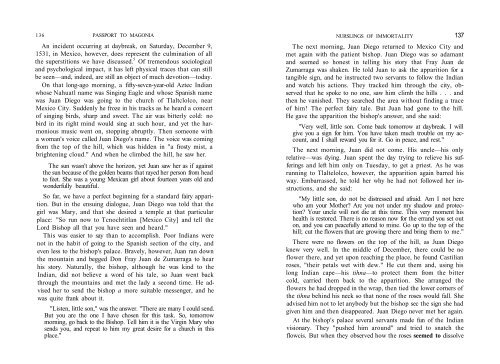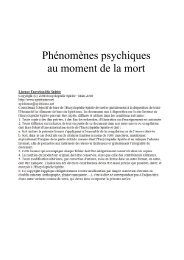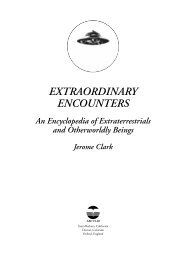You also want an ePaper? Increase the reach of your titles
YUMPU automatically turns print PDFs into web optimized ePapers that Google loves.
136 PASSPORT TO MAGONIA<br />
An incident occurring at daybreak, on Saturday, December 9,<br />
1531, in Mexico, however, does represent the culmination of all<br />
the superstitions we have discussed. 5 Of tremendous sociological<br />
and psychological impact, it has left physical traces that can still<br />
be seen—and, indeed, are still an object of much devotion—today.<br />
On that long-ago morning, a fifty-sevcn-year-old Aztec Indian<br />
whose Nahuatl name was Singing Eagle and whose Spanish name<br />
was Juan Diego was going to the church of Tlaltclolco, near<br />
Mexico City. Suddenly he froze in his tracks as he heard a concert<br />
of singing birds, sharp and sweet. The air was bitterly cold: no<br />
bird in its right mind would sing at such hour, and yet the harmonious<br />
music went on, stopping abruptly. Then someone with<br />
a woman's voice called Juan Diego's name. The voice was coming<br />
from the top of the hill, which was hidden in "a frosty mist, a<br />
brightening cloud." And when he climbed the hill, he saw her.<br />
The sun wasn't above the horizon, yet Juan saw her as if against<br />
the sun because of the golden beams that rayed her person from head<br />
to feet. She was a young Mexican girl about fourteen years old and<br />
wonderfully beautiful.<br />
So far, we have a perfect beginning for a standard fairy apparition.<br />
But in the ensuing dialogue, Juan Diego was told that the<br />
girl was Mary, and that she desired a temple at that particular<br />
place: "So run now to Tcnochtitlan [Mexico City] and tell the<br />
Lord Bishop all that you have seen and heard."<br />
This was easier to say than to accomplish. Poor Indians were<br />
not in the habit of going to the Spanish section of the city, and<br />
even less to the bishop's palace. Bravely, however, Juan ran down<br />
the mountain and begged Don Fray Juan de Zumarraga to hear<br />
his story. Naturally, the bishop, although he was kind to the<br />
Indian, did not believe a word of his tale, so Juan went back<br />
through the mountains and met the lady a second time. He advised<br />
her to send the bishop a more suitable messenger, and he<br />
was quite frank about it.<br />
"Listen, little son," was the answer. "There are many I could send.<br />
But you are the one I have chosen for this task. So, tomorrow<br />
morning, go back to the Bishop. Tell him it is the Virgin Mary who<br />
sends you, and repeat to him my great desire for a church in this<br />
place."<br />
NURSLINGS OF IMMORTALITY 137<br />
The next morning, Juan Diego returned to Mexico City and<br />
met again with the patient bishop. Juan Diego was so adamant<br />
and seemed so honest in telling his story that Fray Juan de<br />
Zumarraga was shaken. He told Juan to ask the apparition for a<br />
tangible sign, and he instructed two servants to follow the Indian<br />
and watch his actions. They tracked him through the city, observed<br />
that he spoke to no one, saw him climb the hills . . . and<br />
then he vanished. They searched the area without finding a trace<br />
of him! The perfect fairy tale. But Juan had gone to the hill.<br />
He gave the apparition the bishop's answer, and she said:<br />
"Very well, little son. Come back tomorrow at daybreak. I will<br />
give you a sign for him. You have taken much trouble on my account,<br />
and I shall reward you for it. Go in peace, and rest."<br />
The next morning, Juan did not come. His uncle—his only<br />
relative—was dying. Juan spent the day trying to relieve his sufferings<br />
and left him only on Tuesday, to get a priest. As he was<br />
running to Tlaltelolco, however, the apparition again barred his<br />
way. Embarrassed, he told her why he had not followed her instructions,<br />
and she said:<br />
"My little son, do not be distressed and afraid. Am I not here<br />
who am your Mother? Arc you not under my shadow and protection?<br />
Your uncle will not die at this time. This very moment his<br />
health is restored. There is no reason now for the errand you set out<br />
on, and you can peacefully attend to mine. Go up to the top of the<br />
hill; cut the flowers that are growing there and bring them to me."<br />
There were no flowers on the top of the hill, as Juan Diego<br />
knew very well. In the middle of December, there could be no<br />
flower there, and yet upon reaching the place, he found Castilian<br />
roses, "their petals wet with dew." He cut them and, using his<br />
long Indian cape—his tihna—to protect them from the bitter<br />
cold, carried them back to the apparition. She arranged the<br />
flowers he had dropped in the wrap, then tied the lower corners of<br />
the tihna behind his neck so that none of the roses would fall. She<br />
advised him not to let anybody but the bishop sec the sign she had<br />
given him and then disappeared. Juan Diego never met her again.<br />
At the bishop's palace several servants made fun of the Indian<br />
visionary. They "pushed him around" and tried to snatch the<br />
flowcis. But when they observed how the roses seemed to dissolve





